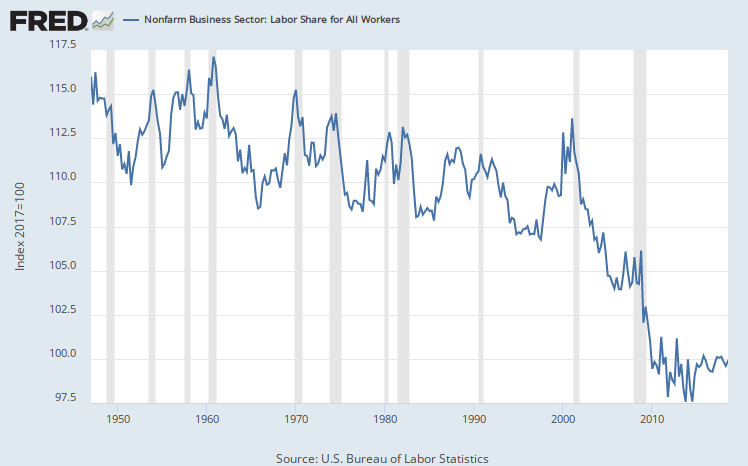So when I go to the supermarket and buy a cut of beef from the butcher, it's the owners of the supermarket who provide the service, not the butcher who actually cuts the beef and gives it to me?
You aren't paying the butcher - the supermarket is. They are the ones who have ensured that the right materials, services, and offerings will be made available at convenient distances and times so that you can receive it. The guy working there is serving
them, which is why they pay him.
So why are people willing to pay so much less today when there is so much more wealth?
1. This is not necessarily accurate. Different kinds of labor and services have moved upwards or downwards over the past few decades. For example, there is much less demand for horse-shoeing now than there was a hundred years ago.
2. That being said, if you are referring to low-skill general-manual-labor, well, gosh. Do you think maybe us importing millions upon millions of low-skill manual laborers, and encouraging owners to invest in capital instead of humans via high regulatory costs might have something to do with that?

In that situation then the monolith would re-emerge and out-compete the higher priced competitors. I still don't see the problem.
Sure. Then shoot the employees. They'll heal, and in fact, if you break their bones, their bones will heal stronger. No problem.
Standard Oil, AT&T. There are plenty of examples.
That is interesting indeed. I would like, if you could be so kind, for you to link to the times when the government seized Standard Oil or AT&T and broke it up solely for your purpose of seeing whether or not that would cause the perceived value of someone who drove a truck to increase. We may have some data which will help us partly answer your thought experiment

.
McDonald's has only 17% of the fast food market share (and Yum! is close behind with 11%). That's nowhere near Amazon's 49%. Do you have a better example?
So McDonalds is able to manipulate the market better than Wendy's. Ergo, Wendy's doesn't compete with them.
Sorry. Amazon has
lots of competitors. You countering that people are more likely to prefer Amazon's current services than any other particular option, even if they are even on whether or not they prefer it to all other options doesn't change that fact.
Absolutely not. My issue isn't with a company just being really big. I don't really care about that.
Hm. Well, all-right, but if so, to avoid confusion maybe you should quit talking about it being big, arguing for breaking it up, and suggesting that 50% of a market share somehow means none of its competition exists.
My issue is with a company getting privileges and abusing them by being so much bigger than anyone else. If Amazon pays their employees 20% less than what they're worth, who's going to compete to force them to raise wages?
Everyone else who hires similar employees, which you have already admitted is
at least 50% of the market, and, if you look at how those professions also serve non-internet-market companies, you will find is actually quite a lot more. Amazon doesn't hire anything close to 50% of drivers, 50% of general managers, or 50% of manual-laborers.
This is just dishonest argumentation. You know what I'm arguing. You're sneaking in this assumption that people are paid the value of their labor. That's simply not true.
It is true. I think your sticking point here is that you are insisting that
your value of their labor
should be forced on others.
I want market rates for labor to be nearer to marginal productivity.
The labor theory of value? No thanks. If someone is extra productive and works hard, putting in 12 hour days making stacks and stacks of mud pies, that's still not as valuable to me as someone who spends 8 hours a day sort of lethargically providing me with bacon and housecleaning services, and I have no intention whatsoever of giving the first person more of my money than the second.
Over the past 50 years the opposite has occurred.
How do you look at that and give a thumbs up? Something is clearly broken.
No. Technology clearly continues to advance. Though, how do you square your own source stating that hourly compensation is up with your earlier claim that people are being paid "so much less"?


